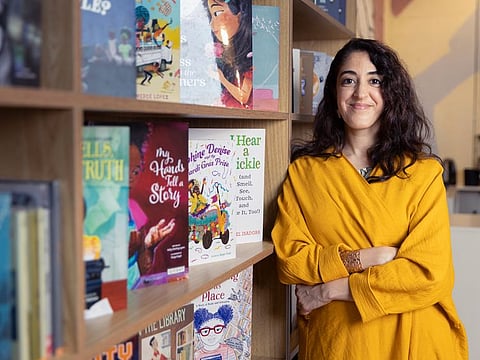Kutubna: A hub for cultural dialogue and artistic discovery
Shatha Al Mutawa founded Kutubna to celebrate and preserve contemporary Khaleeji culture

Shatha Al Mutawa has made it her mission to showcase contemporary Khaleeji culture, highlighting a rich artistic expression often overlooked by the Gulf nationals and residents.
When the Emirati-Kuwaiti national began compiling lists of books to stock at Kutubna, the bookshop and cultural centre she founded in Dubai’s Nadd Al Hamar, she realised the wealth of art and literature created in the post-Trucial States years.
From poetry and fiction to experimental plays and Emirati philosophy, even just the important works wouldn’t fit in her 6,000sq ft store.
“I wasn’t aware that, for example, in the seventies and eighties, in the nineties, that there were all kinds of thriving literary scenes here,” she says. “We didn’t really study it in school [in Kuwait], but there were and there are Emirati philosophers and thinkers of all kinds.”
Nor, as a US graduate student reading 10th-century Arabic texts from Iraq, was she able to find the kind of commentary about classics that is regularly published in Arabic newspapers.
Kutubna is therefore a personal project, she says. She set it up after her child was born, once she’d moved back from the US, to reconnect with Emirati and Khaleeji culture.
“It’s about me pursuing my love, it’s my love for my child, it’s my love for ideas and books, and also my love for my country,” she says.
Along the way, she encountered many other people from the region who shared her experience. “[As children] we were so absorbed by Hollywood movies and the magazines we were getting from the US or the UK and the internet …but now we’re starting to go back and realise that we’re missing out on so much that is rich and beautiful and meaningful.”
Naturally, Kutubna had to be more than simply a place to buy books. To truly curate contemporary culture, it would need to host talks, readings and exhibitions — as bookshops do in other countries.
Last month, for example, the Emirati playwright Naji Al-Hai gave a talk on the UAE’s experimental theatre scene in the 1980s. A regular series of art appreciation workshops covers different regions; in November it was Palestinian and Lebanese artists, this month’s series examines Emiratis. Kutubna also runs Dubai Humanities, a festival of emerging scholarship that recognises how “people in the Gulf are producers of knowledge, not just consumers of knowledge,” Al Mutawa says.
UAE residents can access these events at the store, and by taking out a Kutubna membership.
In some ways, Al Mutawa’s timing is perfect — as we begin to seek out in-real-life (IRL) experiences away from our overwhelmingly digital lives and as artificial intelligence (AI) and the works it produces make deeper inroads into our lives.
“If I want to read a book that reflects me and who I am and my culture and my family and the context that I come from,” Al Mutawa says, “no ChatGPT or AI app is going to give me that lived experience of humanity.” ■



